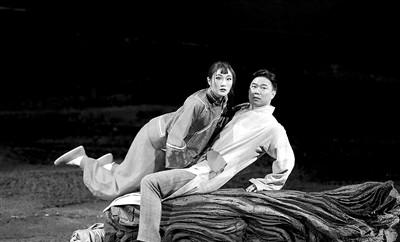
◎ Zhu Pigeon
Last month, "The Wilderness," directed by Yan Rui, premiered at the Cao Yu Theater in Beijing. Compared with the 2000 Version of Li Liuyi and the 2010 Version of Chen Yiyi, this is a "youth version" of "Wilderness", in which all young actors reinterpret the classics and eras of Cao Yu's plays.
The new version of "Wilderness" retains the main plot, conflict and character relationship of the original book in the adaptation. At the beginning of the curtain, in the sound of the train's whistle, Qiu Hu jumped off the train to return to the wilderness in order to take revenge, and in the narrative and dialogue with Jinzi, Jiao Mu and others, he revealed the reason for the hatred, launched a revenge action, killed his former friend Jiao Daxing, killed the son of Da Xing by the hand of Jiao Mu, and went with Jin Zi to "the place where Jinzi paved the road", but Qiu Hu, who had completed his revenge, had great fear and hallucinations in his heart, and committed suicide in the black forest that could not be walked out and under the pursuit of the detective team.
The original script mainly shows the rebellious spirit of the peasants and the inner plight of the people through the revenge of the tiger, and the focus of the whole drama is almost around the series of actions of the revenge of the tiger. In the new version of "Wilderness", it seems to turn more of a focus to gold. Qiu Hu's return made the gold of the cowardly Big Star and the vicious mother-in-law feel alive, and the two souls who dared to love and hate and were compatible with each other were reunited, and through Qiu Hu's fierce revenge, the struggle with Jiao Mu, and the cowardly dislike of Jiao Da Xing, it reflected the unrestrained and free gold. The new version deletes the state of a large number of spiritual fans of Qiu Hu in the original play, and this treatment weakens Qiu Hu's sense of self-redemption and strengthens the hope and light of obtaining a new life. It not only conveys the harm of traditional society to human nature, but also provides reflections on how contemporary people face difficulties to redeem themselves.
In the original script, Qiu Hu's specific sources of hatred and strong revenge intentions are inseparable from the background of warlord melee and peasant struggle at that time, and how to talk about "Wilderness" at the moment, this version of the answer given is "breaking through the barriers and finally running to an ideal spiritual world", strengthening the emotional elements, starting from the perspective of "people", and establishing an emotional connection with the audience. In the gold that dares to love and dare to hate, we can see the spirit of female independence, the yearning for freedom and the life without confinement, and the firm and clear pursuit of love. Through the psychological activities between Jin Zi and Qiu Hu that are constantly changing with the development of the dramatic plot, vivid, complex and three-dimensional people are shown.
To a certain extent, the interpretation of young actors can inject new vitality into the classic repertoire, although it is slightly immature. Zhang Keying's jinzi is less wild and more feminine, although the wild nature of "born in the field, growing in the field, and perhaps dying in the field in the future" is not strong enough, but it is more focused on showing a woman who is not willing to be imprisoned living between a cowardly husband and a vicious mother-in-law; Jin Han's Qiu Hu is more "humane", and Lei Jia's Jiao Daxing has the shadow of Hu Jun's version.
In the stage art style of "minimalism" and "minimalism", the new version of "Wilderness" retains the atmosphere of mysticism and expressionism of the original play, with the black forest in the distance, the dark clouds overhead, the rough ground under the feet, the crooked furniture, wandering dolls, and the hidden Jiao Yan Wang, with live music, creating an extremely depressing atmosphere from the visual and auditory senses. For example, playing the cry of The Little Kuroko with a cry is so tragic that it is creepy; the setting of the dolls promotes the development of the plot and externalizes the psychological activities of the tiger; the stage installation is also more modern, such as the sinking stage after the death of the little kuroko, and the rotating stage at the end of the tiger kneeling and dying. But this kind of atmospheric rendering, which relies almost entirely on the stage installation, occupies the performance space of the actors and the imagination of the audience, and is only wrapped up in the strong emotions that come in.
At the end, with the rotation of the circular stage, a wave of red gold standing in the splendid blossoms, Qiu Hu kneeling and dying in the gray field, under this strong contrast of color and fate, Qiu Hu completed the self-redemption of the soul, and the gold went towards the golden, hopeful distance, realizing the new life. This hope is not only the hope of Jin Zi and Qiu Hu, but also the hope of the innocent little black son, and the hope of all those who are in trouble and struggling. Photography / Fang Fei